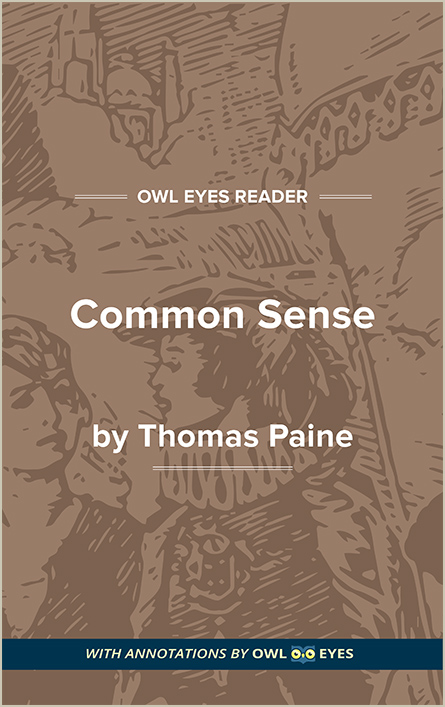Analysis Pages
Themes in Common Sense
Themes Examples in Common Sense:
I. Of the Origin and Design of Government in General, with Concise Remarks on the English Constitution
🔒"the peers are an house in behalf of the king; the commons in behalf of the people; but this hath all the distinctions of a house divided against itself..." See in text (I. Of the Origin and Design of Government in General, with Concise Remarks on the English Constitution)
"a mode rendered necessary by the inability of moral virtue to govern the world..." See in text (I. Of the Origin and Design of Government in General, with Concise Remarks on the English Constitution)
"For were the impulses of conscience clear, uniform, and irresistibly obeyed, man would need no other lawgiver..." See in text (I. Of the Origin and Design of Government in General, with Concise Remarks on the English Constitution)
II. Of Monarchy and Hereditary Succession
🔒"it is the pride of kings which throw mankind into confusion..." See in text (II. Of Monarchy and Hereditary Succession)
"Mankind being originally equals in the order of creation..." See in text (II. Of Monarchy and Hereditary Succession)
III. Thoughts on the Present State of American Affairs
🔒"Neither can ye reconcile Britain and America..." See in text (III. Thoughts on the Present State of American Affairs)
"it is infinitely wiser and safer, to form a constitution of our own in a cool deliberate manner..." See in text (III. Thoughts on the Present State of American Affairs)
"and the whole, being impowered by the people, will have a truly legal authority..." See in text (III. Thoughts on the Present State of American Affairs)
"nothing but independance, i.e. a continental form of government, can keep the peace of the continent and preserve it inviolate from civil wars..." See in text (III. Thoughts on the Present State of American Affairs)
"no farther than it answers her own purpose..." See in text (III. Thoughts on the Present State of American Affairs)
"The object, contended for, ought always to bear some just proportion to the expence..." See in text (III. Thoughts on the Present State of American Affairs)
"Every quiet method for peace hath been ineffectual..." See in text (III. Thoughts on the Present State of American Affairs)
"Our plan is commerce..." See in text (III. Thoughts on the Present State of American Affairs)
"we claim brotherhood with every European christian, and triumph in the generosity of the sentiment...." See in text (III. Thoughts on the Present State of American Affairs)
"this is certainly a very round-about way of proving relationship, but it is the nearest and only true way of proving enemyship..." See in text (III. Thoughts on the Present State of American Affairs)
"’Tis not the affair of a city, a country, a province, or a kingdom, but of a continent..." See in text (III. Thoughts on the Present State of American Affairs)
IV. Of the Present Ability of America, with Some Miscellaneous Reflections
🔒"We are sufficiently numerous, and were we more so, we might be less united..." See in text (IV. Of the Present Ability of America, with Some Miscellaneous Reflections)
"If premiums were to be given to merchants, to build and employ in their service ships..." See in text (IV. Of the Present Ability of America, with Some Miscellaneous Reflections)
"Wherefore, if we must hereafter protect ourselves, why not do it for ourselves?..." See in text (IV. Of the Present Ability of America, with Some Miscellaneous Reflections)
"our methods of defence, ought to improve with our increase of property..." See in text (IV. Of the Present Ability of America, with Some Miscellaneous Reflections)
"Tar, timber, iron, and cordage are her natural produce..." See in text (IV. Of the Present Ability of America, with Some Miscellaneous Reflections)
"The more sea port towns we had, the more should we have both to defend and to lose..." See in text (IV. Of the Present Ability of America, with Some Miscellaneous Reflections)
"would take place one time or other..." See in text (IV. Of the Present Ability of America, with Some Miscellaneous Reflections)

